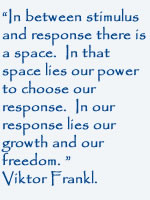Anxiety is a sense of feeling agitated or unsafe, or even feeling dread: as if you’re waiting for something bad to happen. Sometimes there are specific things you are afraid might happen, sometimes it’s just a general feeling of apprehension. This can often leave you feeling immobilised and unable to take action, and this can be exhausting.
Anxiety is also your best attempt to take care of yourself, an attempt to keep yourself safe. It’s just that one of the ways anxiety tries to keep you safe, is by stopping you from moving or even wanting to move. This not moving also maintains your anxiety, in a vicious circle.
What we find when we explore the when and how of your anxiety developing, is that there are reasons why you developed anxiety as a symptom. Anxiety is often based on things that have already happened, even if you are not aware what has caused it. It may not even be something big: children can be overwhelmed by events that don’t overwhelm adults, and can then carry this generalised response into adulthood. This may mean that you feel overwhelmed by anything that triggers the same feeling, even if it seems unrelated, whether it's making a phone call, doing an assignment, going in to work, or a relationship break-up.
Avoidance of anything difficult seems like a solution to anxiety. Avoidance of difficult tasks or situations or feelings in order to lower anxiety can seem to work in the short term to lower your anxiety. In fact, avoidance reinforces and increases your levels of anxiety, making it worse in the long term. You may find you have to avoid more and more things to keep feelings of anxiety at bay. In turn, this can lead to an increasing sense of helplessness and even depression. Moving, taking action even in small steps, is the opposite of avoidance and is part of what will decrease anxiety in the long term.
One way of treating anxiety is keeping an anxiety diary, and to gradually learn what triggers your anxiety. You can then use this information as you learn to interrupt your avoidance in small steps. At the same time it's important to understand how you are trying to look after yourself with your anxiety, and how to achieve this in other, more constructive ways.
1. Breathe.
This is one of the proven, simplest and most effective things you can do for your anxiety. Breathe more slowly and deeply. Count to four as you breathe in, then count to six or eight as you breathe out, through your nose, not your mouth. This interrupts what anxiety is doing to your body. Do ten to twenty breaths like this many times during the day. Keep practicing.
2. Practice kindness to yourself and towards your anxiety.
As I have said, your anxiety is serving a purpose, it is your attempt to look after yourself in some way. Acknowledge your anxiety, acknowledge that it's taking care of you, instead of fighting it, or blaming yourself. Do this whenever you remember, many times a day.
3. Awareness: Keep an anxiety diary
Twice a day, morning and night, notice your anxiety and rate it out of 10. Keep a brief note of things that happened especially if your anxiety is high or low on a particular day. Start noticing what increases and decreases your anxiety. This can also help you feel some hope about the possibility of change.
The Reality Slap. By Russ Harris. Learn how to cope effectively when life hurts or causes anxiety. You can also download an MP3 of the exercises in the book, which can very useful for developing self-compassion and learning to address anxiety.
The Dose Effect. By TJ Powers. This books focuses on the four neurotranmitters that impact our mood, motivation and general sense of wellbeing. Levels of dopamine, oxytocin, serotonin and endorphin can be impacted by anxiety, stress and depression. This book offers straightfoward explanations and suggestions for evidence-based behaviour changes and small habits that can have a positive impact on your levels of neurotransmitters and overall wellbeing.
Self-compassion: the proven power of being kind to yourself. By Kristin Neff.
Self compassion is an essential component of resilience. Self compassion involves protecting ourselves and also motivating ourselves towards action. Being protective and supportive of ourselves builds emotional resilience to face the difficulties in life. We are better able to deal with stressful situations.
And also her website.
Full Catastrophe Living: Using the Wisdom of Your Body and Mind to Face Stress, Pain, and Illness. By John Kabat-Zinn, M.D. The heart of the book is based on Kabat-Zinn’s renowned mindfulness-based stress reduction program at the University at Massachusetts Medical Center. Anything by this author is worth reading. A deep understanding of the causes of anxiety and depression.
Also WATCH video clip of Dr. Kabat-Zinn.
Your Inner Child of the Past.
By Hugh Missildine. How patterns of responding can be established in childhood, and how to support yourself to change them.



